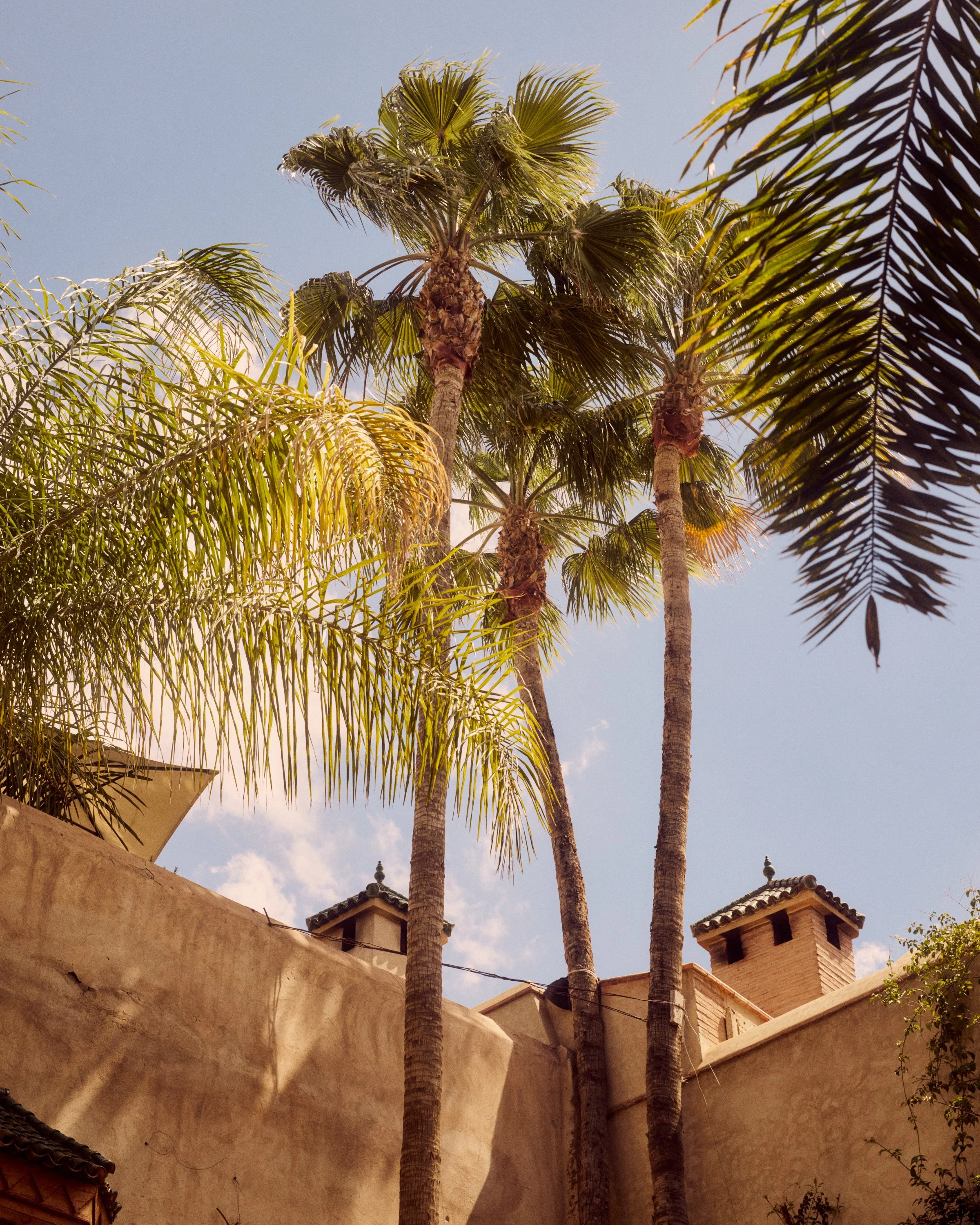Moroccan Memories
Words & Photographs by Leon Foggitt
I arrived in Marrakech late on a warm and hazy March afternoon. The palm trees lining the road swayed lazily in the breeze, and I watched on mesmerised from my hot taxi, which smelled strongly of tobacco smoke.
Once inside the Medina walls (a UNESCO World Heritage Site), my driver assured me that we were as close to my hotel as he could get, so I jumped out into the mayhem. Scooters wizzed past, donkeys pulled carts and groups of men stood on corners keen to offer directions or information in exchange for a tip.
After some wide-eyed confusion, I finally stumbled across the large yet unassuming wooden door that led to my hotel, and the chaos was replaced with mint tea and smartly dressed porters. I was staying at El Fenn, a stunning and unique hotel in the heart of the Medina. What started out as a semi-derelict riad in 2002 has gradually grown into a 2,700 square meter hotel that stretches across 13 interconnected riads and boasts 41 rooms and suites. The hotel’s dramatic courtyards, peaceful rooms and decorative abundance has earned it a reputation as one of Marrakech’s most beautiful hotels.
It’s the sort of space that makes you feel infinitely more elegant simply for being there. The public areas are a collection courtyards, each with heir own distinctive features and atmosphere. Some have small pools or velvet sofas, while others brim with lemon trees and jungle-like assortments of tropical plants and trees.
Stepping inside my suite, I was greeted by tall glass doors that opened to a private balcony adorned with palm trees and sun loungers. A tapestry served as the headboard, an open fire crackled and armchairs beckoned. The space felt tranquil and opulent, and it was hard to image that just outside the hotel’s walls lay the maze-like Medina and one of the world’s more hectic cities. In a lot of ways, it’s this contrast that makes El Fenn such an appealing place to stay.
When I wanted to be amongst the drama, I would step out into the baking heat of the Medina and experience all manor of intense experiences: snake charmers, the general hustle and bustle of the narrow streets, markets selling a variety of herbs, spices and potions. I would be approached from all angles with offers of directions, advice or a photo with some sort of exotic animal. And when all of that was a bit much I’d wander back to the hotel, where even the stifling heat of the narrow Medina felt like a thing of the past.
I don’t think I would have been able to leave El Fenn if I didn’t have a drive east to the city of Essaouira ahead of me - who can resist the allure of a road trip?
I’d left my Essaouira plans pleasantly open ended - my only goal to wander about, get a feel for the place and take a few photos. And the moment I stepped from my car I was struck by the atmosphere. Far more relaxed than Marrakech, parts of Essaouira felt almost Mediterranean, although that illusion soon dissolved as the call to prayer came across the towns tannoy system and residents rushed along the winding streets to their places of prayer.
Even Essaouira’s souks seemed different. They still had the multitude of shops and stalls selling beautifully crafted local products - argan oil, rugs, antique Berber jewellery - but there wasn’t any hassle to buy, only friendly conversations and a laid-back attitude that I’ve come to associate with beach towns.
After I’d had my fill of roaming the souks’ ancient streets, I found myself in the fishing port. As a photographer, I’m often like a moth to a flame to any sort of working harbour, and this one didn’t disappoint. 20 or more men had all manor of freshly-caught seafood laid out on makeshift stalls. Fish were gutted, remains left for seagulls and cats, shrimp bagged by the handful, and the price of everything was bartered for.
Further along was a flotilla of colourful fishing vessels, rusty chains and anchors strewn across their decks. Men with leathery, sea-battered skin worked aboard while flocks of seagulls circled ahead, waiting for a fresh dinner. As I snapped away, a fisherman gestured for me to board his boat, and I promptly obliged, clamouring across three other boats to reach him.
He spoke in broken English (and I managed a few words in rusty French) as he showed me round the vessel. What struck me most were the sleeping quarters - tight, rickety wooden bunks deep in the dark belly of the boat. I could only imagine how I’d feel down there on rough seas, and was grateful to be heading to my comfy, dry apartment for the night.
The remaining few days were spent in the same manor; strolling idly around the town, getting lost down alleyways, daydreaming by the harbour wall watching the sea. As I started to plan my drive back to Marrakech, I reflected on my Moroccan escape - the places I’d seen and the people I’d met - and it became clear that it wouldn’t be long until I returned to explore more of this fascinating country. The wonderful people, culture, sights and smells had left too much of an impression on me. Another adventure was required.













